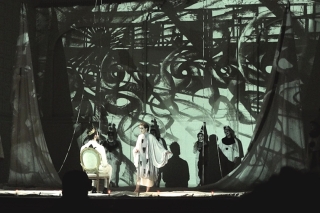In episode #2 of the Schwarzman Center web series, One, MFA student Camilla Tassi YSD ‘21 talks with Estefani Castro YSD ‘21 about her work in projection design—the integration of digital projection into live events. Tassi discusses how she uses technology to spark emotional connections in opera, classical music and experimental arts, and she reflects on physical distance as an opportunity for dialogue between artists and audiences.
‘One’ Episode 2: Camilla Tassi finds emotion and meaning in projection design

Tassi’s pursuits in projection design stemmed from her early exposure to opera, as well as her interdisciplinary background in computer science and music.
She explained, “I grew up in Florence, Italy. My grandma, when I was about 10 years old, gave me a CD of Verdi’s Nabucco. And even though, to be honest, I was just listening to one track over and over…I know I wasn’t having some, you know, deeply intellectual connection to opera. I didn’t even know about harmonic progressions much.”
Tassi would go on to achieve Bachelor of Science and Bachelor of Arts degrees in Computer Science and Music, respectively, at the University of Notre Dame. She would later earn her Master of Arts degree in Digital Musics at Dartmouth College and serve for a year as a Special Research Fellow in Projection Design at Yale before joining Yale School of Drama as an MFA student.
I’m interested in using design as a tool to help ask, "Why are we doing this piece of music, this piece of work today? Why in this space?" — to question the work more fully.
She continued, “I’m interested in using design as a tool to help ask, Why are we doing this piece of music, this piece of work today? Why in this space? — to question the work more fully.”
While studying remotely from Florida, and without access to theater-grade projectors, Tassi has been designing prototypes on a handheld “pico” projector. She remains undaunted by the disruption, however, and says that physical distance might inspire artists to focus less on the “spectacle aspect” of visual design and more on the intentionality of their work in relation to the stories the visuals support.
Tassi also offered a word of gratitude to the Schwarzman Center saying, “I’ve been thinking a lot about students graduating from Yale, both at the undergraduate and graduate levels, and how the pandemic has resulted into the cancellation of a lot of their culminating degree work, particularly the recitals. And so, I felt compelled to reach out to students…and see if they were willing to share and record at a distance. It’s actually thanks to the Schwarzman Center that they were willing to be a platform for this cross-departmental sharing and creation of art in this period.”
Castro, the host of episode #2, is an MFA student in the Yale School of Drama’s Theater Management program and works as the assistant director for stakeholder engagement at the Schwarzman Center. She conducted the interview with Tassi remotely via Zoom from her residence in New Haven, Connecticut.
One, a web series produced by the Schwarzman Center, highlights interdisciplinary approaches to the arts in relation to the Center’s values of collaboration, wellness and belonging. The inaugural season illuminates the creative and academic merits of student works impacted by social distance and explores perspectives on community-building among dispersed groups. The series title, One, is a nod to the Schwarzman Center’s aspiration to advance a sense of “One Yale” and create an interconnected community that builds new traditions of student engagement around the campus and into the world.
Subscribe to One on the Schwarzman Center YouTube channel. Connect with the Schwarzman Center on Facebook, Twitter and Instagram for the latest digital content and announcements.